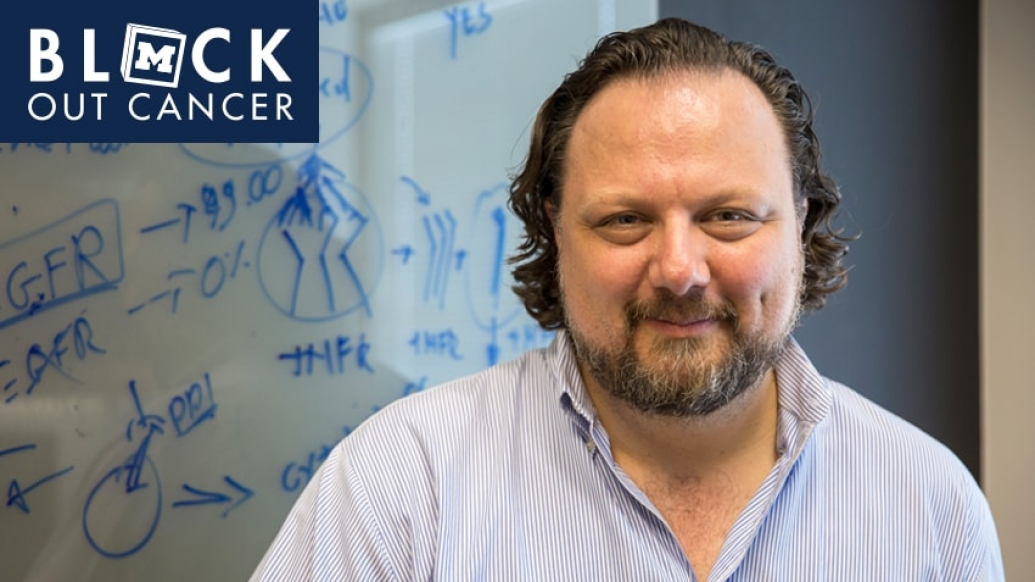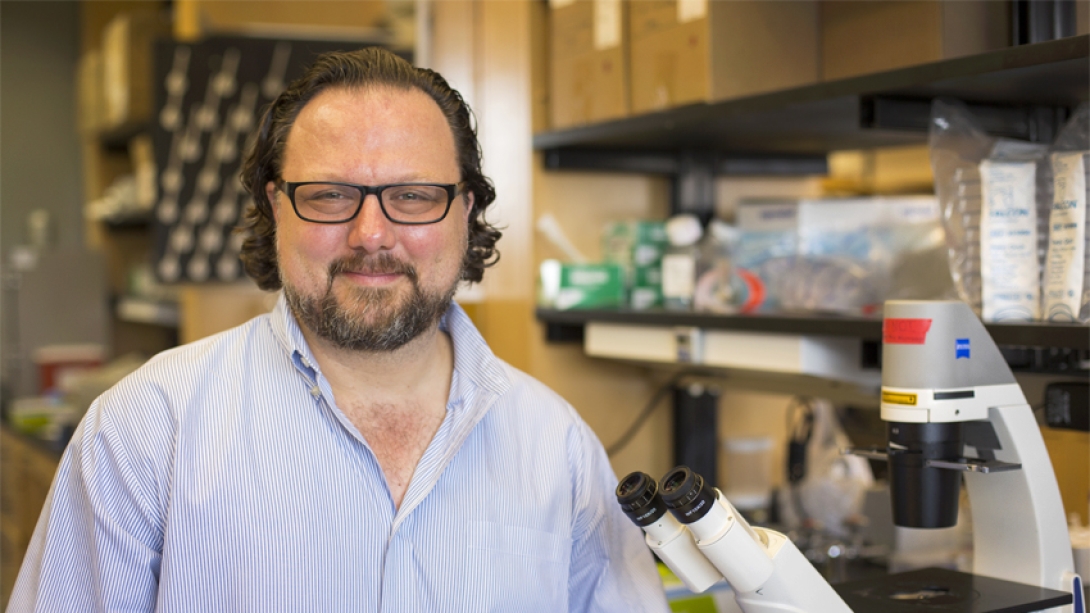The marriage of immune science and cancer research may improve survival rates for some individuals with rare cancers. A groundbreaking U-M scientist explains more.
7:00 AM
Author |

Why does the immune system fail to do its job against certain enemies? What causes it to sometimes turn against the body it's meant to protect? Which drugs strengthen its responses?
SEE ALSO: Balancing Treatment and Toxicity for AML Patients
We're nearing answers to these crucial questions — and to a revolution in our understanding of health and disease.
Take Luigi Franchi, M.D., Ph.D., which Thomson Reuters named among the top 100 immunologists in the world for his pivotal research. The Italian-born scientist has devoted his life to studying the immune system, and today, he has one mission at University of Michigan's C.S. Mott Children's Hospital: To empower the immune system to fight the most dreaded type of pediatric brain cancer, diffuse intrinsic pontine glioma (DIPG).
"Not having an effective medication for a child with cancer is unacceptable, and unfortunately there has not been any significant improvement in DIPG treatments in the last 30 years," says Franchi, an assistant professor of pediatrics in hematology and oncology at Mott who has biopharmaceutical experience developing immune-active drugs.
"Our team is committed to discovering an immune therapy drug target for DIPG — one that can maximize the benefit of other therapies and potentially be curative."
Brain tumors are the leading cause of death from childhood cancer. More than 90 percent of children diagnosed with the highly aggressive and inoperable DIPG tumor — which stems from the region of the brain that controls breathing and heart rate — die within 18 months.
Franchi's team aims to develop approaches that apply the promise of immune therapy toward DIPG. His lab was recently funded by a grant from the V Foundation made in honor of Chad Carr, former U-M football coach Lloyd Carr's grandson, who died from DIPG in 2015.
"This is a tragic diagnosis faced by too many families," says Franchi, who lost his own father to an incurable brain tumor. "There have to be better answers. We are determined to find them."
Below, he explains more about his work.
How does the immunology field help cancer research?
Franchi: A new era of cancer therapy in recent years has revolutionized the field by finding ways to leverage the immune system to treat cancer. This breakthrough came from scientific discoveries that showed how tumor cells hide cancer cells from the immune system to prevent it from recognizing and fighting the disease.
Immunotherapy boosts the body's natural defenses to work harder and smarter to attack tumors, and we have seen this work for patients with otherwise incurable cancers. While the idea is not new, we now have a molecular-level understanding of immune function and envision immune therapies becoming the backbone of cancer treatment.
Specifically, how can your immunology research ultimately help treat DIPG?
Franchi: We hypothesize that specific, abnormally active proteins in DIPG tumor cells are responsible for silencing the immune system.
Although currently unproven, evidence points to a mechanism in which specific mutations send abnormal signals to the immune system to make the tumor invisible to the immune cells capable of killing cancer — particularly after tumor cells are treated with chemotherapy or radiation.
Our team is studying cell lines from DIPG tumors to test which ones are blocking immune signaling. We will work to overcome this 'off switch' by developing drugs that either selectively bind to or target the mutation, reactivating the immune system and restoring regular immune response to attack the tumor.
We are also investigating which immune cell receptors can bypass the immune silencing effect of the tumor. We know that a single stimulation of the immune system may potentially reverse the tumor's immune suppression powers.
Our goal is to unveil this immune-suppressive mechanism in order to identify better drug targets to treat DIPG, and ultimately, improve survival rates.

What stage is this research in — and what's next?
Franchi: We have also been studying how the immune system acts out against viruses and other microbes. One of the most exciting possibilities stemming from this science is using the virus to stimulate new responses in the tumor.
SEE ALSO: Doctors Unleash New Weapon to Fight Pediatric Neuroblastoma
We know that one of the major limitations for immunotherapy is that an inflammatory environment conducive for immune activity is not present in all tumors. One approach to induce inflammation within the tumor is to infect tumor cells with microbes, such as viruses, in order to call in inflammatory cells. This approach, however, has practical limitations, including the generation of a weak inflammatory response and difficulties producing a virus that is safe for therapeutic purposes, particularly safe for infecting the brain.
What we have learned through our 20 years of studying the immune system, however, is that we can mimic what the virus is doing without actually using the virus — similar to what we do in vaccines like the flu. In the past 10 years, immunologists have learned which specific molecules isolated from viruses and other microbes trigger an inflammatory response.
This method makes it possible to induce these single molecule signals that have proven to be strong immune activators to induce protective immune response against cancer in animal models.
We hope to expand our research on how we can use this in DIPG treatment.
What else is key to making headway against DIPG and other rare cancers?
Franchi: Research has proven that chemotherapy, radiotherapy and surgery, which together have been the foundation for cancer therapy advances during the last 25 years, are not effective against DIPG. We need to envision entirely new ways of treating DIPG to guide research.
Unfortunately, research aimed at uncovering cures for this disease is also woefully underfunded because it's considered rare by medical statistics. Just 4 percent of federal funding for cancer research goes to children's cancer — and pediatric brain cancer receives even less.
No one person — no matter how knowledgeable — can make this type of breakthrough discovery. It takes a team of people with unique sets of expertise who can bring those pieces of the puzzle together and an institutional commitment to supporting the research.
The University of Michigan has all the pieces in place to develop a center of excellence for pediatric brain tumors long term. We have a dream team of scientists and doctors across specialty areas that together are combining research advances in basic science, precision medicine and immunology in the war against DIPG. We share the same scientific goals.
Research led by U-M's Maria G. Castro, Ph.D., for example, has developed the first animal model of pediatric malignant brain tumors. We will be able to use these models to conduct our experiments and study what drives DIPG in order to develop and test potential new drug treatments.
Mott pediatric oncologist Rajen Mody, M.B.B.S., and colleagues are also advancing research on next-generation genomic sequencing to personalize treatment to the genetic mutations that make a child's cancer unique and cause their tumor to grow.
Over the next five years, our teams will work together to generate and study subjects with DIPG tumors, collect data and perform drug screening and testing of the newest, most promising therapies available.
This post is part of a series of articles on breakthrough pediatric cancer research during Childhood Cancer Awareness Month. Learn more about how you can play a role in the fight to Block Out Cancer.

Explore a variety of healthcare news & stories by visiting the Health Lab home page for more articles.

Department of Communication at Michigan Medicine
Want top health & research news weekly? Sign up for Health Lab’s newsletters today!





